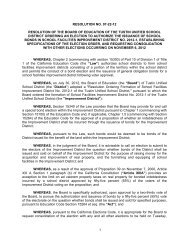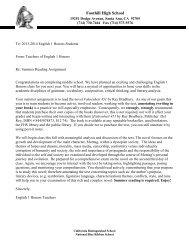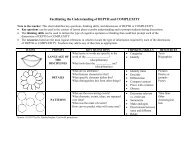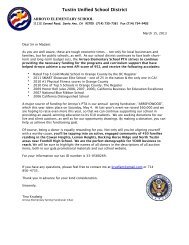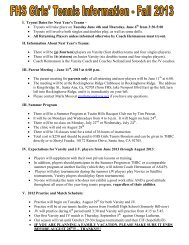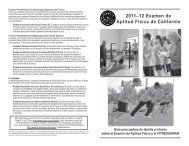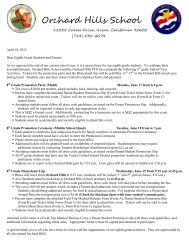College Planning - Tustin Unified School District
College Planning - Tustin Unified School District
College Planning - Tustin Unified School District
You also want an ePaper? Increase the reach of your titles
YUMPU automatically turns print PDFs into web optimized ePapers that Google loves.
the final decision<br />
your<br />
turn<br />
The final decision<br />
Your financial aid award letters<br />
have arrived. Now is the time to<br />
carefully consider your options<br />
and select the types of aid and<br />
school that are the best fit for<br />
you. This section will help you<br />
choose the right school, guide you<br />
through the final steps in receiving<br />
your financial aid, and help you<br />
financially prepare yourself for<br />
college.<br />
Checklist: Senior year<br />
april<br />
may<br />
Review your award letters.<br />
You should receive financial aid award<br />
letters from the colleges that have accepted<br />
you for admission. Review them with your<br />
parents or a trusted advisor. Be sure you<br />
understand the terms and conditions for<br />
each type of aid.<br />
Weigh your options and make<br />
your decision.<br />
Using the worksheet on page 25,<br />
compare and weigh your options.<br />
Notify the colleges of your final decision.<br />
Each college that accepted you for<br />
enrollment needs to know whether you plan<br />
to accept or decline its offer. Follow the<br />
colleges’ instructions to let them know your<br />
final decision.<br />
Send a deposit to your college of choice.<br />
Many colleges require that you send a<br />
deposit to reserve your place and formalize<br />
your college acceptance. You may submit a<br />
deposit to only one college. The exception<br />
to this is if you are put on a wait list by<br />
a college and are later admitted to that<br />
college.<br />
Send in your financial aid forms.<br />
Sign your financial aid award letter and<br />
any other items requiring your signature<br />
and return them. If you have questions,<br />
schedule an appointment with a financial<br />
aid officer. If you have decided to accept<br />
a loan, understand all your rights and<br />
responsibilities before you and/or your<br />
parents sign.<br />
june<br />
Update the college on your financial<br />
aid situation.<br />
Notify the financial aid office of any outside<br />
scholarships, grants, or other kinds of<br />
student aid from private sources that you<br />
have received since you submitted your aid<br />
application.<br />
Send letters of decline to financial aid<br />
offices.<br />
If you have received financial aid award<br />
letters from colleges whose offers you have<br />
decided to decline, notify the financial aid<br />
office in writing because other students will<br />
need the aid you declined.<br />
Arrange for housing and meals at the<br />
college you will attend.<br />
If necessary, arrange for housing and a meal<br />
plan for the fall.<br />
Send your final transcript.<br />
Your college will need confirmation of your<br />
graduation.<br />
summer<br />
Work and save.<br />
Make a plan for saving a portion of your<br />
summer earnings.<br />
Make a budget.<br />
Find a Budget Worksheet online at<br />
www.ecmc.org/FinancialLiteracy.<br />
Attend orientation at your new college.<br />
Make plans to attend required summer<br />
orientation sessions at the college.<br />
Understanding your award letter<br />
Once you have been accepted for enrollment at<br />
any college and have applied for financial aid<br />
by completing the Free Application for Federal<br />
Student Aid (FAFSA) and any other financial<br />
aid forms required by the college, you and your<br />
family will receive a financial aid award letter.<br />
This letter will detail the amount of financial<br />
support the college is able to provide for the<br />
upcoming year. You might receive the award<br />
letter along with your notice of acceptance.<br />
Some colleges make the award letters available<br />
online. Check with your colleges to see how<br />
they distribute the award letters.<br />
read the fine print<br />
··<br />
Read your award letter carefully to ensure<br />
you understand all terms and conditions so<br />
you can decide if you want to accept any, or<br />
all, of the aid offered.<br />
··<br />
Look for instructions for your next steps.<br />
You might need to complete additional<br />
paperwork (e.g., loan applications).<br />
··<br />
Determine if grants or scholarships are<br />
available for more than one year. If so, what<br />
are the applicable conditions?<br />
··<br />
When comparing financial aid awards,<br />
consider your final out-of-pocket cost.<br />
An award containing loans may have a<br />
higher ultimate out-of-pocket cost than an<br />
equivalent award that contains mostly grants.<br />
keep your college aware of<br />
changing situations<br />
Has your family situation changed since<br />
you filed the FAFSA? Has a parent become<br />
unemployed or ill? Have you been awarded<br />
additional private scholarships? You must<br />
report any changes to the college. Even name<br />
and address changes must be reported. Any of<br />
these changes can affect your award.<br />
23




